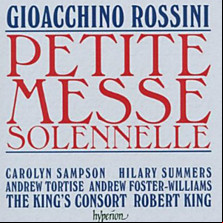BBC Review 1bj6o
Rossini's solemn mass, written towards the end of his life, is performed here in its...
Andrew McGregor 2006
Rossini's small solemn mass, the last of his Péchés de vieillesse - his sins of old age: a last testament then, the composer bowing his head before God over 30 years after he'd ended his career in opera. Yes, it's solemn - a serious religious work, yet the mass also has the most delightful touches from a man who remained a theatrical composer to the end.
But small it isn't- lasting well over an hour, and it wasn't intended for a church, but for a salon in a Paris townhouse...that's where the scoring becomes fascinating: two pianos and harmonium.
Robert King has chosen two pianos that were in use in Paris at the time, a Bösendorfer and a Graf, and a French harmonium from 1868 by Debain, the same make Rossini used, and quite different from the American type you're more likely to hear. Gary Cooper and Matthew Halls play the late 19th century pianos, and seated at the period Parisian harmonium, presumably having trained on an exercise bike beforehand, is Mark Williams; together they provide a feisty, characterful accompaniment.
It's the original version of Rossini's Mass, with just 12 voices, as intended by Rossini (he made a comparison to the 12 disciples) and Latin pronunciation that King believes would have been used in late 19th century Paris. He its to having had something of a tenor crisis due to illness during rehearsal and recording, and there were certainly times when I could imagine individual parts being better sung, but I like the fact that the overall effect isn't operatic, and that every attempt seems to have been made to be faithful to Rossini's original intentions. That includes the acoustic, which sounds as though it's chosen to resemble a salon and not a church.
One other advantage: the performance doesn't feel rushed, but they've managed to bring it in at a whisker under 80 minutes, which means it fits onto a single CD. I love the sound it makes, and it includes one of Rossini's great melodies for the Gratias agimus tibi: you'll be humming it for hours.
Like This? Try These:
Haydn: The Creation (Harnoncourt)
Pergolesi: Marian Vespers (Higginbottom)
Vivaldi: Arie d'Opera (Modo antiquo)
